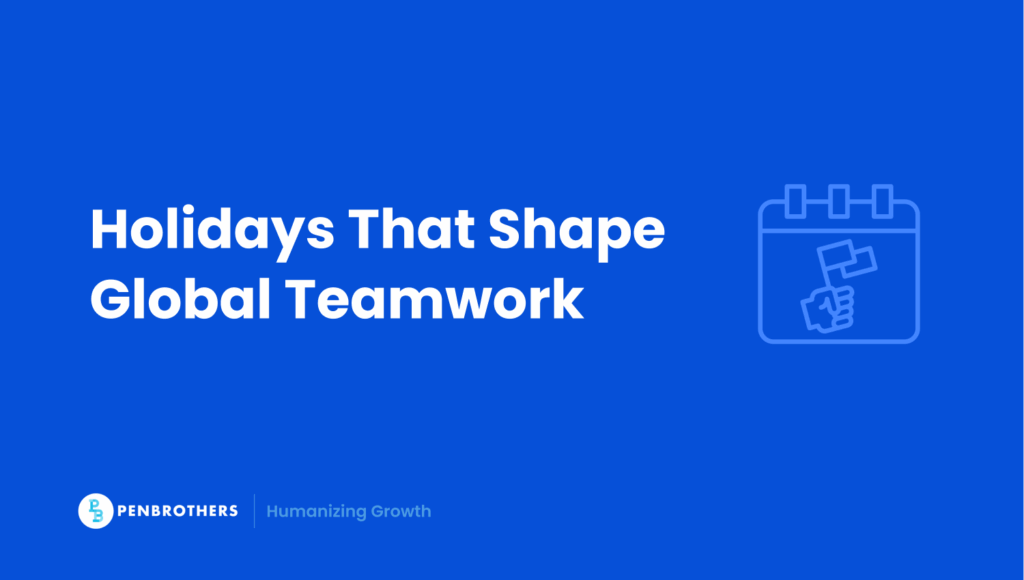Independence Day 2025 isn’t just a celebration—it’s a lens for business leaders to rethink global partnerships.
For many US companies, offshoring is a tactical decision driven by cost. But in the face of persistent talent shortages, shifting global dynamics, and the pressure to scale leaner and faster, offshore collaboration has become strategic. And when two countries share a history of independence, aligned values, and decades of diplomatic cooperation—like the US and the Philippines—that collaboration goes deeper than metrics.
These national holidays—July 4 and June 12—aren’t just about waving flags. They symbolize shared principles that, when mirrored in business, unlock trust, resilience, and growth. They’re a reminder that the best partnerships aren’t just contractual—they’re cultural.
Shared Values Behind Independence Days
Both nations commemorate battles for sovereignty and self-determination. The US declared independence from Britain in 1776, emphasizing liberty and the pursuit of happiness. The Philippines proclaimed independence from Spain on June 12, 1898, highlighting resilience and the will for self-rule.
Did you know there was a time when both countries shared the same Independence Day? The Philippines was granted full independence by the United States on July 4, 1946, and celebrated it as Independence Day for nearly two decades. In 1962, President Diosdado Macapagal moved the official holiday to June 12 to honor the earlier declaration from Spain. While June 12 is now the national holiday, July 4 remains deeply symbolic—a reminder of the Philippines’ transition to full sovereignty and its historical ties with the US.
Historical Ties that Strengthen Trust
The historical relationship between the US and the Philippines has laid a foundation of mutual respect and cooperation. Following the Philippines’ independence in 1946, the two nations have maintained strong diplomatic, economic, and cultural ties.
This enduring partnership has manifested in:
- Economic Collaboration: The US has been a significant trade partner and investor in the Philippine economy. The US is one of the Philippines’ top trading partners, with two-way goods trade totaling over $23.5 billion in 2024. This enduring economic relationship builds trust, predictability, and shared interests that naturally extend into business collaboration, including offshore staffing.
- Educational Exchanges: Programs and scholarships have facilitated knowledge transfer and cultural understanding. Initiatives such as the Fulbright Program and USAID-funded educational projects have helped thousands of Filipino students and professionals gain international exposure and advanced training.
- Military Alliances: Joint defense agreements have reinforced security cooperation. This strategic alignment has contributed to a strong diplomatic foundation that supports long-term business and operational partnerships between the two nations.
Such historical connections have fostered a level of trust that is invaluable in business collaborations, assuring US companies of the reliability and integrity of their Philippine counterparts.
Why the Philippines Delivers Strong Infrastructure for Offshore Success
Beyond cultural and historical ties, the Philippines offers tangible benefits that make it an attractive offshore destination:
- Cost Efficiency: Companies can save up to 70% on labor costs by hiring offshore workers in the Philippines compared to local markets. This substantial cost reduction does not come at the expense of quality. Offshore roles—particularly in customer service, finance, marketing, and software development—are filled by professionals with strong educational backgrounds and competitive skill sets. See the cost savings breakdown to better understand the financial impact.
- Skilled Workforce: The Philippines continues to produce a steady pipeline of qualified professionals. Many graduates hold degrees in business administration, engineering, IT, communications, and finance—fields directly aligned with offshore service requirements. This deep talent pool enables companies to scale teams quickly while maintaining operational efficiency.
- Time Zone Advantage: The Philippines operates in the GMT+8 time zone, which conveniently overlaps with several US time zones. This allows for partial to full real-time collaboration, particularly during early morning or late afternoon US hours. For companies offering 24/7 customer support or running agile development cycles, this time zone compatibility enhances productivity and response times.
- Government Support: The Philippine government actively supports the growth of its IT-BPM sector through tax incentives, digital infrastructure improvements, and training programs via TESDA. The industry is classified as a priority sector, which means companies enjoy favorable policies that reduce operational friction. Additionally, economic zones managed by PEZA (Philippine Economic Zone Authority) provide infrastructure and tax perks that further lower the cost of doing business offshore.
These factors, combined with the cultural and historical synergies, position the Philippines as a strategic partner for US companies seeking to enhance their global operations. Need proof? See how Spotship cut costs and scaled fast with a Philippines-based team.
Why Filipino Talent Fits US Teams Naturally
The cultural affinity between the US and the Philippines is a significant asset in offshore staffing. Filipino professionals are known for their strong English proficiency and familiarity with Western business practices, making integration into US-based operations seamless.
Key aspects of this compatibility include:
- Language Proficiency: The Philippines ranked 22nd globally and 2nd in Asia in the 2023 EF English Proficiency Index—one of the highest in the region. Filipino professionals are not just fluent; they’re context-aware communicators. That means fewer misunderstandings, faster onboarding, and seamless integration into cross-functional teams.
- Educational Excellence: With over 700,000 college graduates entering the workforce annually, and a strong emphasis on business, IT, engineering, and communications, the Philippines offers a talent pipeline that’s both volume-rich and role-ready. IBPAP projects that the country’s IT-BPM workforce will hit 1.82 million in 2024, a testament to the sector’s continued strength and scalability.
- Cultural Affinity with the West: A shared colonial history, strong media influence, and decades of bilateral engagement have fostered an intuitive understanding of Western values and work dynamics. This doesn’t just make communication easier—it reduces friction in feedback, collaboration, and management styles. Learn more about Filipino cultural traits and values that contribute to effective offshore partnerships.
- Communication Style: Filipino professionals bring more than language fluency—they bring a high level of emotional intelligence and cultural sensitivity in how they communicate. This shows up in their ability to adjust tone, navigate hierarchy, and read between the lines—critical traits when working across time zones and functions. Whether it’s writing a client-facing email or raising a blocker in a sprint review, they balance respect with assertiveness, making collaboration feel smoother and more human. For US managers, this means fewer awkward moments, faster trust-building, and team dynamics that feel naturally aligned.
- Fit with US Workflows: Filipino talent doesn’t just adapt to US workflows—they often excel in them. With a strong orientation toward accountability, responsiveness, and continuous improvement, Filipino professionals are a natural fit for fast-paced, results-driven teams. Whether it’s participating in standups, managing deadlines in project management tools, or owning KPIs, they’re used to working within US-style business rhythms. Add to that a strong sense of respect for processes, openness to feedback, and a proactive attitude—and you get offshore teams that don’t feel like vendors, but like true extensions of your core operations.
What Does Penbrothers Do Differently
- Embedded Talent Enablement
Cultural fit opens the door—but it’s role-specific context and post-hire support that drive sustained impact. At Penbrothers, we don’t stop at onboarding—we embed your business DNA into every talent we deploy, then stay hands-on through hypercare support to ensure alignment in real-time operations.
For example:
- A virtual operations assistant isn’t just added to Slack—they’re oriented on your communication culture, prioritization style, and typical decision paths, while our team monitors early workflows to ensure they’re moving at the right rhythm.
Our hypercare model ensures that once the team is deployed, you’re not alone in managing them. We provide close support during the critical ramp-up phase, so your offshore hires don’t just understand the job—they internalize how your business thinks.
- Proactive Team Design
Offshoring fails when teams are hired for the what but disconnected from the how. That’s why Penbrothers doesn’t just match résumés to job descriptions—we build teams that mirror your workflow architecture, tooling environment, and collaboration cadence.
Here’s what that looks like in practice:
- For customer support setups, we build teams that can deliver across multiple channels—email, live chat, voice—with aligned shift scheduling, SLAs, and escalation workflows that match your real-time service model.
- For back-office functions, we map how tasks flow into the team (from finance, sales, or HR), and ensure your offshore talent is trained not just on tasks, but on cross-functional expectations and timing dependencies.
It’s not just about hiring offshore—it’s about designing offshore to work like it’s onshore.
- Performance That Mirrors Your HQ
A strong start is important. But long-term success comes down to clarity, accountability, and calibration—and that’s where Penbrothers excels.
We don’t just track activity. We help offshore teams understand what great looks like in your business context, and we reinforce it with:
- Shared KPIs and success metrics built from your internal scorecards—whether it’s response time, error rates, NPS, pipeline velocity, or sprint completion rates.
- Regular performance reviews and reporting, customized to your cadence (weekly, biweekly, monthly) so that you’re never guessing where things stand.
- Embedded team leads or account managers who don’t just report data, but flag risks, identify bottlenecks, and propose solutions—before performance slips.
This is how we turn offshored roles into strategic extensions of your core team—trusted, high-performing, and tightly aligned to your growth goals.
Penbrother’s Success Story
How a US Company Collaborated with a Philippine Team to Cut Costs by 69% and Scale Operations
When US-based workforce management firm Servantex set out to build a cost-efficient service center, they needed more than just headcount—they needed talent who could quickly plug into their complex operational ecosystem. From payroll and billing to HR, risk, and compliance, the stakes were high. They turned to Penbrothers to fill one accounting specialist role. But after experiencing the quality of hires and seamless integration into their workflow, they expanded. Fast.
Today, Servantex’s offshore team in the Philippines includes 10 Service Center Specialists and a CRM Administrator, enabling 24-hour support for their in-house operations. Through Penbrothers’ full-service model—including talent sourcing, onboarding, compliance, payroll, and retention engagement—Servantex eliminated administrative overhead and scaled with confidence. The result? A 69% average cost savings per role, without compromising performance or service quality. See the full Servantex success story here.
Final Thoughts
The celebration of Independence Days in the US and the Philippines serves as a reminder of the shared values that underpin the relationship between the two nations. For US businesses, recognizing and embracing these commonalities can lead to more effective and harmonious offshore collaborations. By partnering with Philippine teams, companies not only gain operational advantages but also contribute to a legacy of mutual respect and shared success.
As we commemorate Independence Day 2025, let it also be a chance to strengthen your global strategy. Reflect on the shared values that power successful offshore teams—freedom, resilience, and unity—and consider how a culturally aligned partner like the Philippines can help scale your business with confidence. If you’re looking to build a high-performing offshore team grounded in trust, talent, and long-term value, now is the time to start that conversation.






